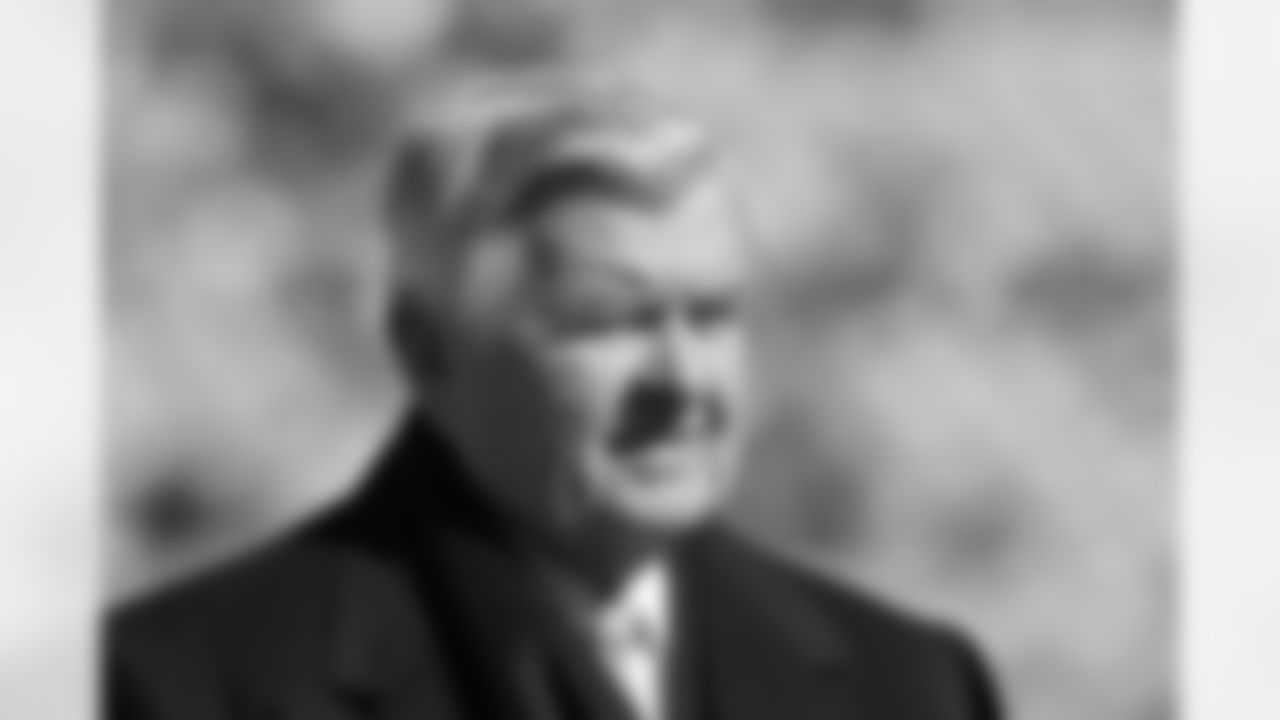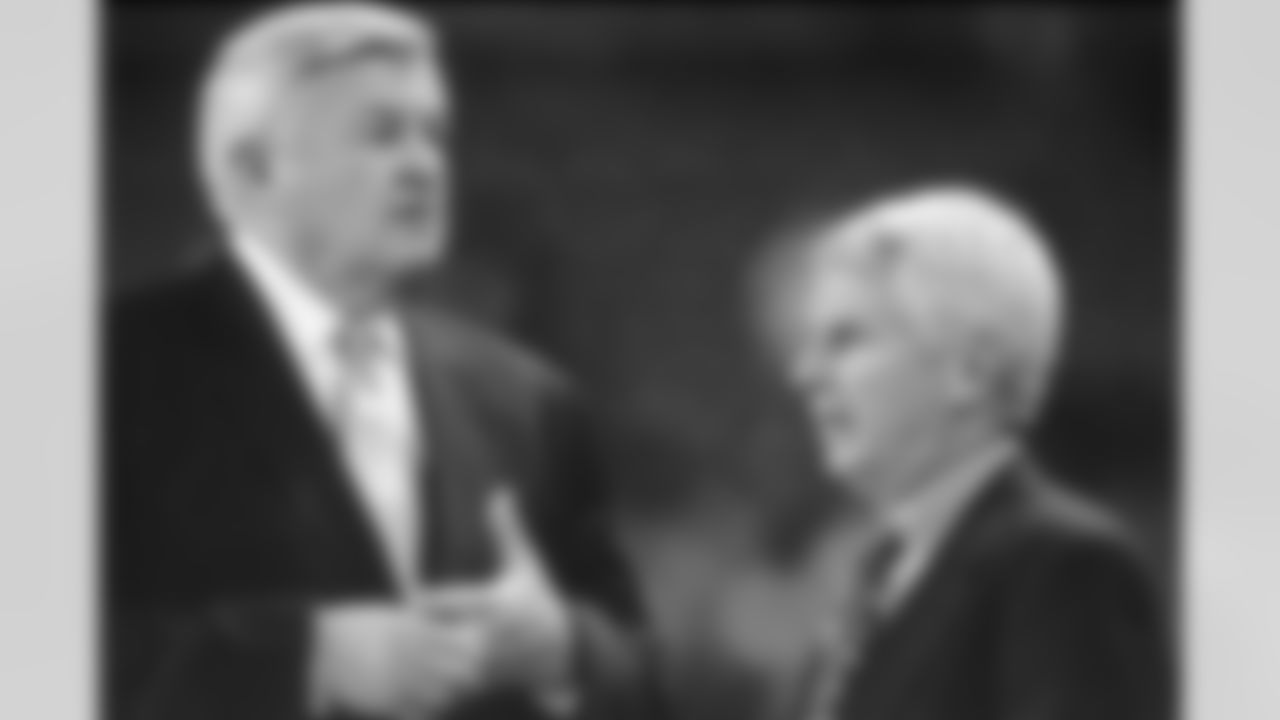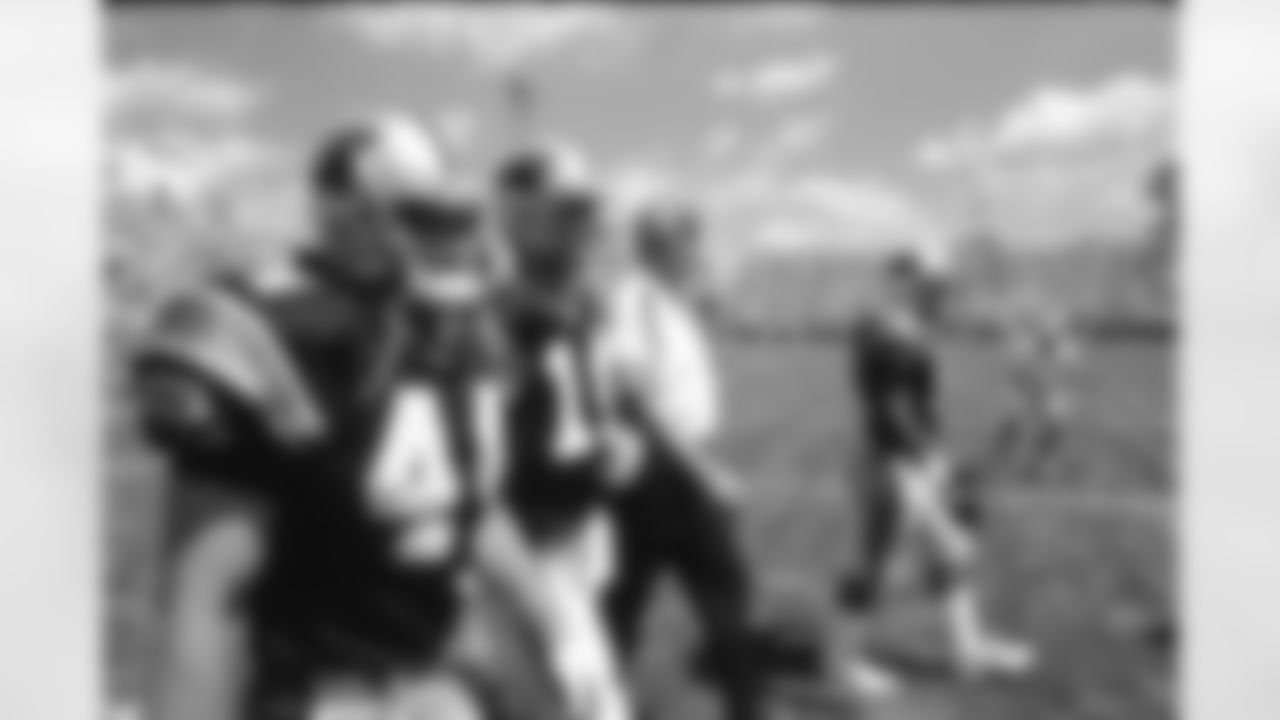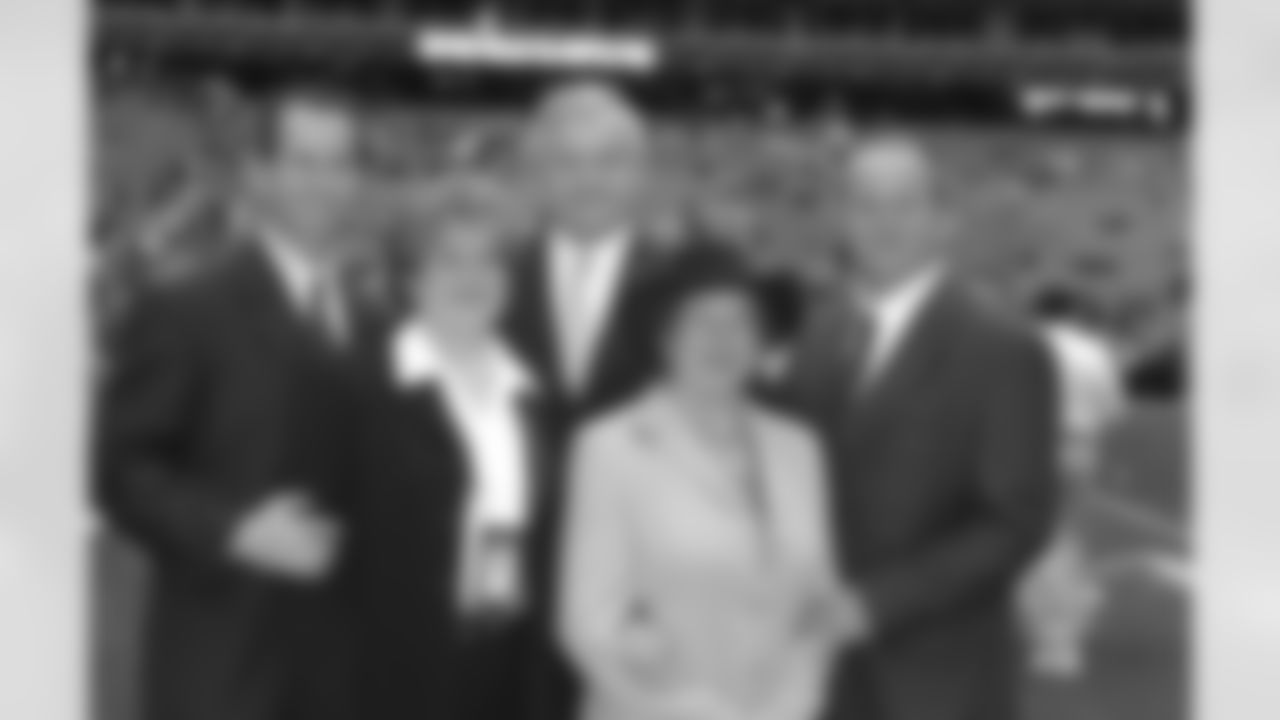CHARLOTTE — Jerry Richardson, the founder of the Carolina Panthers, passed away Wednesday night at age 86.
A native son who was shaped by the region, his personal journey culminated with bringing professional football to the Carolinas, leaving an indelible mark on the area he loved.
"Jerry Richardson's contributions to professional football in the Carolinas are historic," Panthers owners David and Nicole Tepper said in a statement. "With the arrival of the Panthers in 1995, he changed the landscape of sports in the region and gave the NFL fans here a team to call their own. He was incredibly gracious to me when I purchased the team, and for that I am thankful. Nicole and I extend our deepest condolences to Rosalind, the entire Richardson family, and their loved ones. We wish them much peace and comfort."

Jerome J. Richardson was born July 18, 1936, in Spring Hope, N.C., the first step in a journey that would transform the Carolinas.
After growing up in the Fayetteville area, Richardson went to Wofford College in Spartanburg, S.C.; where he excelled in football and laid the groundwork for a business empire that would allow him to return to the game he once walked away from.
He still holds the school's single-game record for receiving yards (241 against Newberry in 1956), as well as records for touchdown receptions in a season (9) and career (21). That kind of production earned him Associated Press Little All-America honors in 1957 and 1958, and in 1959, he was drafted by the Baltimore Colts.
With the Colts, he roomed with quarterback Johnny Unitas, and caught a touchdown pass from the Hall of Famer in the 1959 NFL Championship Game.
But after his second season, he walked away from the NFL in a dispute over money, and returned to Spartanburg to start his business career. Using his championship game bonus as seed money, he opened his first Hardee's restaurant in Spartanburg.
There, he began creating the emphasis on customer service that would carry over into his stewardship of his football team.
When he owned the team, Richardson would often refer back to the lessons learned selling hamburgers. He'd drop in on restaurants from time to time to check up, sticking his head in the drive-through line to surprise customers and employees alike.
That kind of attention to detail was not unlike his days as owner of the Panthers, in which he'd approve particulars of landscaping plans (native plants from each state on the north and south sides of the stadium to represent the two Carolinas) and the paint job on the field. On game days, he'd ride around Bank of America Stadium in his golf cart, greeting fans and taking pictures, relishing the moments.
But before he could ride around those games and bask in the adulation of having brought the NFL to the Carolinas, he had to deliver them.
Richardson began the process of building a football team in July of 1987, when he met with former Bank of America CEO and Charlotte icon Hugh McColl to discuss his dream of bringing the sport to his home state.
Charlotte had already become a professional sports town with the arrival of the NBA's Hornets in 1988, but those were the days when the city struggled to build an identity as anything other than a regional outpost, still confused with Charleston, S.C. or Charlottesville, Va., and years from becoming a national banking center.
Along the way, decisions were made that changed the face of sports business. He enlisted sports marketing executive Max Muhleman, and they put in place the first permanent seat license concept, in which fans paid an up-front fee for access to season tickets. The Panthers were the first team to employ the concept, and the influx of cash was crucial to privately financing what was then known as Carolinas Stadium.
But until Oct. 26, 1993 — the day Richardson was awarded the NFL's 29th franchise — it was all still a dream, to everyone but Richardson.

"I never thought about not getting a franchise," Richardson said, expressing his trademark confidence. "The odds against us were huge. People had said it was 150-to-1, 200-to-1. That never deterred me.
"I didn't pay any attention to it. I was told I couldn't get my company on the New York Stock Exchange before I was 40. I was told, 'You can't make money selling hamburgers for 15 cents.' I've been told a lot of things."
Richardson was rarely one to back down from a challenge, but there were some challenges he couldn't overcome by sheer force of will and determination.
He began to slow down as he entered his mid-60s, battling heart issues. A bypass surgery in 2002 was just the beginning, and after years of treatments and other procedures, he received a heart transplant on Feb. 2, 2009, at Carolinas Medical Center.
Because so many events in his life seemed to be marked by football time, the procedure began on Super Bowl Sunday, as the Steelers of his close friends the Rooney family were in the process of beating the Cardinals.
But as he stepped back from some of his day-to-day work with the team, his influence within the NFL remained large.
He was a loyal member of the league, and painted "The Shield" logo at the 50-yard-line of his home field throughout his tenure as owner. That allegiance to the league and his status within it also made him one of the lead voices for owners in the 2010 labor negotiations, in which he famously — and sometimes profanely — clashed with players across the table including Peyton Manning. But his work was hailed in league circles as a member of the league's stadium committee, and one of commissioner Roger Goodell's close circle of trusted voices.
As with other captains of industry, Richardson's name adorns a number of buildings throughout the two states, but few places carry it as proudly as his alma mater.
In February 2021, Richardson made a $150 million gift to Wofford, pushing his personal contributions to the school to over a quarter of a billion dollars. Their football stadium already had a name, but the school's new basketball arena and athletic facility still bear his, as does the football stadium at UNC Charlotte.
STATEMENT FROM NFL COMMISSIONER ROGER GOODELL
"The NFL community is deeply saddened by the passing of Jerry Richardson. The Carolina Panthers are a testament to his extraordinary and tireless dedication to the community. But his league-first attitude as seen through his leadership of numerous NFL committees, including the Stadium Committee and Management Council Executive Committee, helped pave the way for a series of public-private stadium partnerships throughout the country, and collective bargaining agreements that continue to support the growth of the game. As a former player himself, Jerry cared deeply about the welfare of players and the labor agreements he helped negotiate have led to improved pay and benefits for generations of players. From a personal perspective, he was a wise and caring advisor to me, his fellow owners, and many Panthers players and coaches over the years. On the NFL's behalf, I extend our sincere condolences to Jerry's wife, Rosalind, and their family."
STATEMENT FROM HEAD COACH FRANK REICH
"I will always be thankful to Mr. Richardson for providing me with the opportunity to play for the Panthers. Being a part of the inaugural season is something that I will never forget. It was truly a special experience to play a part in the culmination of his efforts to bring football to the Carolinas."
STATEMENT FROM SENIOR ASSISTANT/FORMER HEAD COACH DOM CAPERS
"Jerry Richardson gave me my first opportunity to be a head coach, and I'll always be thankful for that. He provided tremendous guidance to me, and to this day, Karen and I consider him and Rosalind true friends. He and I spent a tremendous amount of time talking about his vision for what the Panthers could do for the Carolinas. To see what the Panthers are today, that's truly a testament to his vision."
View photos of Richardson from the inaugural season in 1995 through decades of coaches and players in the Panthers community.


Carolina Panthers owner Jerry Richardson watches players warm up before an NFL football game against the New Orleans Saints in Charlotte, N.C., Sunday, Nov. 7, 2010. (AP Photo/Chuck Burton)




NFL comissioner Roger Goodell, left, and Carolina Panthers owner Jerry Richardson walk together during a break at an NFL owners meeting in Irving, Texas, Wednesday, Dec. 2, 2015. (AP Photo/Brandon Wade)

Carolina Panthers owner Jerry Richardson, right, introduces the team's new coach, Ron Rivera, left, during a news conference in Charlotte, N.C., Tuesday, Jan. 11, 2011. (AP Photo/Chuck Burton)


Carolina Panthers quarterback Jake Delhomme, left, talks with team owner Jerry Richardson, right, during the NFL team's football training camp in Spartanburg, S.C., on Saturday, July 26, 2008. (AP Photo/Chuck Burton)











The Panthers' 2017 Tree Lighting at Bank of America Stadium.


The Panthers' 2017 Tree Lighting at Bank of America Stadium.




Carolina Panthers owner Jerry Richardson waves to the Panthers fans during warmups prior to their playoff game against the New York Giants at Giants Stadium in East Rutherford, New Jersey on January 08, 2006. The Carolina Panthers defeated the New York Giants 23 to 0. 2005 NFC Wild Card Playoff Game - Carolina Panthers vs New York Giants - January 8, 2006 Giants Stadium East Rutherford, New Jersey United States January 8, 2006 Photo by Ralph Waclawicz/WireImage.com
To license this image (6995493), contact WireImage: +1 212-686-8900 (tel) +1 212-686-8901 (fax) info@wireimage.com (e-mail) www.wireimage.com (web site)





CHARLOTTE, NC - NOVEMBER 28: Owner Jerry Richardson of the Carolina Panthers looks on before the game against the Tampa Bay Buccaneers on September 13, 2004 at Bank of America Stadium in Charlotte, North Carolina. The Panthers defeated the Buccaneers 21-14. (Photo by Scott Cunningham/Getty Images)



















